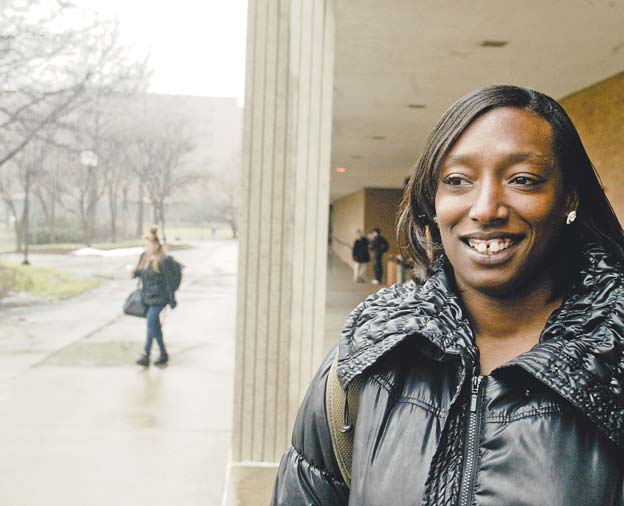Beatitude attitude

Charnitta Benson, a business major at Youngstown State University, lives in Beatitude House permanent supportive housing with her young son. She said the Beatitude House program and staff have helped get her life on track.
By LINDA M. LINONIS
Youngstown
Beatitude House changes lives. It’s not just a catchy slogan but reality for women who have participated in the program.
Sister Patricia McNicholas, executive director since 2001, said she sees transformation in the children of formerly homeless mothers. “They can now be a child ... and not be part of carrying the load,” she said.
Children who may have spent time in shelters dominated by adults are happy to find playmates in transitional and permanent supportive housing in the Beatitude House program.
Beatitude House provides a safe haven for formerly homeless women with children as they work to stabilize their lives. But it’s not a free ride for participants.
Homeless women must apply to the program and be accepted; they can’t have drug or alcohol addictions.
Transitional housing provides a fully furnished apartment. Most families stay from 15 to 18 months while the mother gets a General Education Development diploma and then enrolls in a post-secondary education course to prepare her for employment. There are 25 families in transitional housing.
Jennifer Roberts, Beatitude’s development associate, said many of the women attend Eastern Gateway Community College and Youngstown State University. “They’ve thrived at Eastern Gateway,” Sister Patricia said, noting its Hope Program targets those interested in health-care fields.
YSU and Eastern Gateway work-study programs also are a benefit for the women, Sister Patricia said.
Sister Patricia said the women must abide by rules and meet requirements. Beatitude House residents have curfews, must maintain clean apartments, participate in parenting classes, meet with case managers to make budgets and meet with child advocates to address any issues. School-age children must be enrolled in school. “It’s about providing stability,” Sister Patricia said. “They have to get on their feet pretty fast.”
Permanent supportive housing is a long-term program for women with disabilities and their children. A $207,000 Housing and Urban Development grant made possible 12 new units in addition to the existing units in Mahoning County; four new units in Trumbull County are funded by a $48,000 Ohio Department of Development grant.
Since it was founded in 1991, some 3,200 women and children have gone through the program. Sister Patricia said about 40 percent to 50 percent are fleeing domestic-violence situations. “Some simply left home too young and floundered,” she said. The average age is about 23 with two children.
“We do everything we can to prevent them from going back to homelessness,” Sister Patricia said. Realistically, she said, about 50 percent reach their goals.
Beatitude House has expanded into Ashtabula County, where the former St. Joseph School is being remodeled into 10 units of transitional housing. It’s funded by a $500,000 federal grant.
Beatitude House also operates Potter’s Wheel, a career and education program that offers computer-skills classes, GED classes and life skills.
Green Clean is a cleaning service that is worker-owned by a group of Beatitude House participants. Women “buy” stock in the company, Sister Patricia said. “Most had no real-world job experience,” Roberts said. “This gives them that experience and teaches them about business. They take real ownership.” The Beatitude staff helps run it.
Beatitude House marked its 20th year in October 2011 with a celebration that brought together “graduates” of the program, volunteers and donors. “We saw who was here and how their lives were transformed,” Sister Patricia said, pleased at the career success of participants and their children.
Roberts said there are many memories of mothers and children. She always has remembered a comment by a 10-year-old girl who told Roberts how she was “so glad to have a bedroom.” Roberts said another instance was an adult remembering her time as a child living at Beatitude House. “My child won’t have to,” said the woman, who had broken the homeless cycle and was succeeding in life.
Sister Patricia, who lives at a Beatitude House apartment, said she sees firsthand mothers and children thriving but still facing challenges such as transportation and finances. She always remembers humorous situations, including one boy who has “borrowed” her phone and put his photo on as her wallpaper.
 43
43
